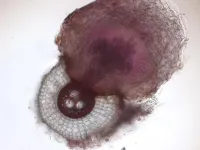(Press-News.org) Bacteria that could help one of Africa’s staple crops resist a major pest have been identified by researchers at the University of California, Davis. Their findings, published March 26 in Cell Reports, could improve yields of sorghum, a mainstay of food and drink in West and East African countries.
About 20 percent of Africa’s sorghum crop is lost due to witchweed (Striga hermonthica), a parasitic plant that steals nutrients and water by latching onto the plant’s roots.
In the new study, UC Davis researchers show that soil microbes induce changes in sorghum roots that make the plant more resistant to infection by witchweed. They identified specific strains of bacteria that trigger these resistance traits and could be applied as a soil “probiotic” to improve sorghum yields in future.
“These microbes have great promise as soil additives that can help farmers grow sorghum successfully in sub-Saharan Africa,” said Siobhan Brady, a professor in the Department of Plant Biology and Genome Center and a senior author on the paper.
A witchy weed
Witchweed is a major issue for smallholder farmers in sub-Saharan Africa. The parasitic plants produce thousands of tiny seeds that can remain dormant in the soil for up to 20 years, making them extremely difficult to eradicate. Current control methods — which include applying chemical agents, crop rotation and breeding resistant sorghum — have achieved only partial control, and many are inaccessible to the farmers who need them most.
Postdoctoral scholar Dorota Kawa worked alongside Brady and collaborators in the Netherlands and Ethiopia to show that soil microbes can mitigate witchweed infections in sorghum.
“This is the first example showing how microbes can induce changes in host root cells that are associated with the suppression of witchweed,” said Brady.
Hijacking a plant signal
When sorghum plants find themselves in low-phosphate soil, they release chemicals from their roots to attract fungi that help them acquire phosphate. Unfortunately for sorghum, witchweed has evolved to respond to this same signal.
“This parasitic plant has hijacked the signaling so that its seeds germinate when they perceive that same signal from the root,” said Brady.
After germinating, witchweed responds to additional chemical cues from sorghum that trigger the parasite to grow appendages called “haustoria” that enable it to latch on and penetrate the sorghum roots.
“Once it has made this connection with the sorghum vasculature, it's like a superhighway of nutrients to the parasitic plant,” said Brady.
Brady and Kawa wanted to know whether soil microbes could interrupt this hijacking. Previous studies have shown that a species of soil fungus, Fusarium, suppresses witchweed germination, and thus infection of sorghum, but little is known about whether soil bacteria or fungi suppress witchweed infections by changing the sorghum root.
As a first test, the researchers compared the susceptibility of sorghum seedlings that had been sprouted in “natural” soil to seedlings grown in sterilized soil. They found that plants grown in natural soil had fewer witchweed hangers-on than those grown in sterilized soil, suggesting that bacteria play an important role in the plants’ ability to resist infection.
Microbial mechanisms
Next, the team wanted to investigate the mechanisms behind this resistance. Using a combination of genetics, microscopy and in vitro experiments, they showed that microbes degrade the chemical cues that help witchweed attach to its host and also alter the sorghum’s root anatomy to make it harder for witchweed to latch on. They observed that when sorghum plants are grown in natural, microbe-laden soil, the bacteria induce genes that result in a thicker layer of suberin, a waxy substance that may act as a barrier to witchweed, and more air-filled gaps or “aerenchymas” that may also impede witchweed’s attachment to sorghum.
Using genetic sequencing, Brady and her collaborators identified over 100 bacteria taxa that were associated with witchweed resistance. When they tested the functions of eight of these bacterial strains in vitro, they identified a strain of Pseudomonas bacteria that degrades chemical cues in the soil and a strain of Arthrobacter that increased root suberization in sorghum.
“It's exciting that we were able to identify individual microbes because typically you have a whole suite of microbes within the soil and it’s possible that they're acting together,” said Brady.
Another tool in the toolkit
“The ultimate goal is to identify microbial solutions that farmers can treat the soil or seeds with to help prevent Striga infection,” Brady said. “The intention is that this should be part of an integrated package of solutions to farmers—another tool in the toolkit.”
Now, the researchers are searching for microbes responsible for conferring other resistance traits. They’re also characterizing soil microbes from other regions, beginning with Ethiopia, and investigating whether these same microbes can confer witchweed resistance to other crop species that are also impacted by the parasite.
“We need to make sure that we're using microbes that come from the country in which those microbes will be applied so that we maintain biodiversity,” said Brady. “We also want to prioritize microbes that are able to work well in other crop species, like pearl millet and rice.”
Additional authors on the study are: Tamera Taylor, Hannah Vahldick, Zayan Musa, Alexander Chen and Jiregna Daksa, UC Davis; Desalegn Etalo, Utrecht University; Benjamin Thiombiano, Aimee Walmsley, Harro Bouwmeester, and Mario Schilder, Swammerdam Institute for Life; Mahdere Shimels, Dominika Rybka, Marcio Leite, Francisco Dini-Andreote, Eiko Kuramae and Jos Raaijmakers, Netherlands Institute of Ecology; Alexander Bucksch, University of Georgia; and Taye Tessema, Ethiopian Institute of Agricultural Research. Kawa is now an assistant professor at Utrecht University.
The work was supported by the Bill and Melinda Gates Foundation, the Howard Hughes Medical Institute, the Advanced Research Projects Agency–Energy and the National Science Foundation.
END
Researchers identify microbes that help plants thwart parasite
2024-03-26
ELSE PRESS RELEASES FROM THIS DATE:
Late surgical repair for preterm babies born with inguinal hernia shows better results compared to early repair, study finds
2024-03-26
Delaying surgical inguinal hernia repair in preterm infants until after discharge from the neonatal intensive care unit (NICU) appears to reduce the likelihood of serious adverse events, according to researchers at UTHealth Houston.
A study led by first and corresponding author Martin L. Blakely, MD, MS, MMHC, professor of surgery and pediatrics with McGovern Medical School at UTHealth Houston, analyzed the safety of early versus late surgical repair for preterm infants born with an inguinal hernia. The findings were published today in the Journal of the American Medical Association (JAMA).
“The biggest question we wanted ...
Two plant extracts with potential as GLP-1 agonist weight loss pills are identified by AI-based analysis
2024-03-26
*Note - This is an early press release from the European Congress on Obesity (ECO 2024) Venice 12-15 May. Please credit the Congress if using this material*
Two plant compounds with potential as GLP-1 agonist weight loss pills have been identified in an AI (artificial intelligence)-based study, the European Congress on Obesity (ECO 2024) (Venice 12-15 May), will hear.
Glucagon-like peptide-1 (GLP-1) receptor agonists such as semaglutide and tirzepatide are highly effective at helping people lose weight. By mimicking the action of a hormone ...
nTIDE March 2024 deeper dive: Gender employment gap narrows among people with disabilities post-COVID
2024-03-26
East Hanover, NJ – March 26, 2024 – The shifting landscape of post-COVID-19 employment highlights a reduction in the gender employment gap among individuals with disabilities, a trend not observed among those without disabilities, according to last Friday’s National Trends in Disability Employment (nTIDE) Deeper Dive Lunch & Learn Webinar.
While men and women with disabilities have similar rates of employment, the data do not address whether women with disabilities in the workforce have lower-quality ...
New genetic analysis tool tracks risks tied to CRISPR edits
2024-03-26
Since its breakthrough development more than a decade ago, CRISPR has revolutionized DNA editing across a broad range of fields. Now scientists are applying the technology’s immense potential to human health and disease, targeting new therapies for an array of disorders spanning cancers, blood conditions and diabetes.
In some designed treatments, patients are injected with CRISPR-treated cells or with packaged CRISPR components with a goal of repairing diseased cells with precision gene edits. Yet, while CRISPR has shown ...
Curbside collection improves organic waste composting, reduces methane emissions
2024-03-26
URBANA, Ill. – Most organic household waste ends up in landfills where it generates methane, a powerful greenhouse gas. Composting food and garden waste instead of sending it to landfills can significantly reduce methane emissions and help mitigate global warming. A new study from the University of Illinois Urbana-Champaign explores the effects of curbside compost collection programs in New South Wales, Australia.
“Governments around the world are interested in composting organic waste and reducing their methane emissions, and they are looking for ways to make ...
Job flexibility and security promotes better mental health among employees
2024-03-26
FOR IMMEDIATE RELEASE
March 26, 2024
Contact:
Jillian McKoy, jpmckoy@bu.edu
Michael Saunders, msaunder@bu.edu
##
Job Flexibility and Security Promotes Better Mental Health
A new nationwide study indicates that workplace policies that provide stability and flexibility to employees boosts overall well-being and encourages workers to seek health services when they need it.
Employment is a recognized determinant of health, and different aspects of a job can be beneficial or deleterious to mental health.
Job flexibility and job security, in particular, are key factors that contribute to employees’ ...
Researchers find energy development and tree encroachment impact Wyoming pronghorn
2024-03-26
While Wyoming is home to some of North America’s most abundant populations of pronghorn that have largely been stable in recent years, a new analysis shows that many herds are experiencing long-term declines in fawn production.
Those declines are primarily a result of oil and gas development and encroachment of trees, according to researchers from the University of Wyoming, the University of Florida, the University of Nebraska-Lincoln, the University of Arkansas and the Northern Plains Agricultural Research Laboratory. Their findings have been published in the journal Global Ecology and ...
Researchers show that introduced tardigrade proteins can slow metabolism in human cells
2024-03-26
University of Wyoming researchers have gained further insight into how tardigrades survive extreme conditions and shown that proteins from the microscopic creatures expressed in human cells can slow down molecular processes.
This makes the tardigrade proteins potential candidates in technologies centered on slowing the aging process and in long-term storage of human cells.
The new study, published in the journal Protein Science, examines the mechanisms used by tardigrades to enter and exit from suspended animation when faced by environmental stress. Led by Senior Research Scientist Silvia Sanchez-Martinez in the lab of UW Department of Molecular Biology Assistant Professor Thomas Boothby, ...
Optimizing electronic health records: Study reveals improvements in departmental productivity
2024-03-26
HUNTINGTON, W.Va. – In a study published in the Annals of Family Medicine, researchers at the Marshall University Joan C. Edwards School of Medicine identify transformative effects of electronic health record (EHR) optimization on departmental productivity. With the universal implementation of EHR systems, the study sheds light on the importance of collaborative efforts between clinicians and information technology (IT) experts in maximizing the potential of these digital tools.
The study, led by a team of health care professionals in a family medicine department, embarked on a department-wide EHR optimization initiative in collaboration ...
Depression in Black people goes unnoticed by AI models analyzing language in social media posts
2024-03-26
Methods researchers developed to detect possible depression through language in social media posts don’t appear to work when applied to posts by Black people on social media, according to a new analysis by researchers from Penn’s Perelman School of Medicine and its School of Engineering and Applied Science. The research, published in PNAS, points to an area to focus on for significant improvement and amplifies the importance of considering the intersection of race, health risks, and social media.
Work in the past uncovered that using first-person pronouns in posts ...






